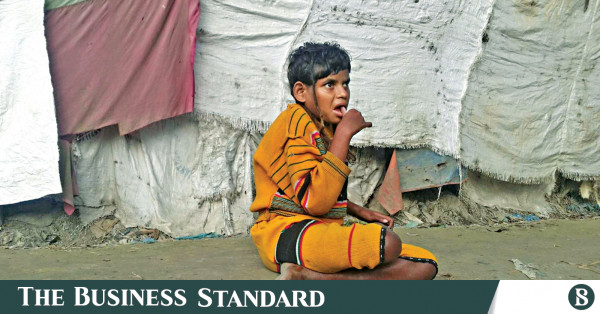What is shocking about this village is that of its 5,500 residents, around 400 are disabled, most of them children, who have been disabled since birth.
Biswanath is a district in Sylhet and is home to a large number of expats, most of whom reside in the UK.
The numerous palace-like buildings with colorful gates and arches in front of the houses testify to the wealth of the residents of Biswanath.However, Amtri village in Rampasha Union is an exception.
The large village has just a few buildings, even fewer artesian wells and sanitary toilets.
What is shocking about this village is that of the 5,500 villagers, around 400 are disabled, most of them children, who have been disabled since birth.
Of the 500 households living here, 90 percent have at least one member with a disability, which includes people with physical and/or mental disabilities.
However, the health department is unaware of this fact.
The Non-Communicable Disease Control (NCDC) programme under the Ministry of Health works for persons with disabilities.
“We have not received any information about the village, which is home to 400 disabled people,” NCDC deputy programme manager Dr Mohammad Shahnewaz Parvez told The Business Standard.
“We will be looking into this matter,” he added.
The Institute of Epidemiology and Disease Control (IEDCR) investigates disease outbreaks, but it does not investigate disabilities, so the IEDCR does not know that there are 400 disabled people in a village.
Asked about the issue, an IEDCR official on condition of anonymity said the IEDCR authorities would look into the matter.
Dr Nehal Karim, a professor of sociology at Dhaka University, was alarmed by the number of disabled people in one village.
“This issue is extremely worrying. There is definitely something unusual going on in the villages which is resulting in disabled babies being born. If arsenic or any other problem is the cause of disabled births then prevention is needed,” he told The Business Standard.
He added that a study on disabilities in the village needs to be carried out.
The district administration should inform higher government officials for prompt preventive measures, he opined.
Maulana Abul Khail from the village is the father of Rafi Mia (6) and Safi Mia (2), both of whom have been unable to walk, move or speak since birth.
“When they were old enough to walk, they could not even sit. When other children were old enough to learn to talk, they could not speak. I took them to doctors in both Sylhet and Dhaka for treatment, but to no avail,” Maulana Abul Khair said about his sons.
Unlike Abul Khair, Abdul Matin, who lives in the same village, does not have such financial means. His daughter Maushumi Begum, who turned 18 this year, has been unable to walk since birth and must be carried around.
Matin, who sells dried fish, has a family of five: two sons, a daughter and his wife.
“I’m struggling to provide for my family, how can I afford to treat my daughter?” he said.
Sources in the Viswanath district social welfare office said a village door-to-door survey was conducted in 2013 to list the number of disabled people.
Parents or guardians of disabled persons had to go to a social welfare office and register the name of their ward.
The source added that a survey showed that there are currently 599 disabled people registered with the union, but some may have been missed from the list.
Rampatsha Union Parishad (UP) chairman Mohammed Alamgir said there are currently around 400 disabled people in the village, of which 350 are children.
The UP chairman said the disabled here undergo physiotherapy at the union parishad office every month. Around half of the disabled people get monthly allowances from the government.
“This is a densely populated village. The environment is very unhealthy. Poverty, malnutrition and lack of awareness about maternal and child health have resulted in a large number of children being born with disabilities,” said Dr Abdul Rahman Musa, health and family planning officer, Biswanath upazila.
“Some people suffer from various illnesses and disabilities after giving birth. The birth rate here is very high,” he added.
Dr Nafeesur Rahman, who also works for people with disabilities, told The Business Standard that there are many reasons why people become disabled.
“Malnutrition, early marriage, lack of antenatal care, iodine deficiency, arsenic prevalence and home birth are some of the major factors that lead to the birth of disabled babies,” Dr Nafeesar said.
He opined that a study was needed to determine the causes of the disorder in the village.
“It is alarming to see so many disabled people in one village. This could be due to malnutrition or iron deficiency,” said Dr Premananda Mondal, a public health physician in Sylhet.

